 Petzlover
Petzlover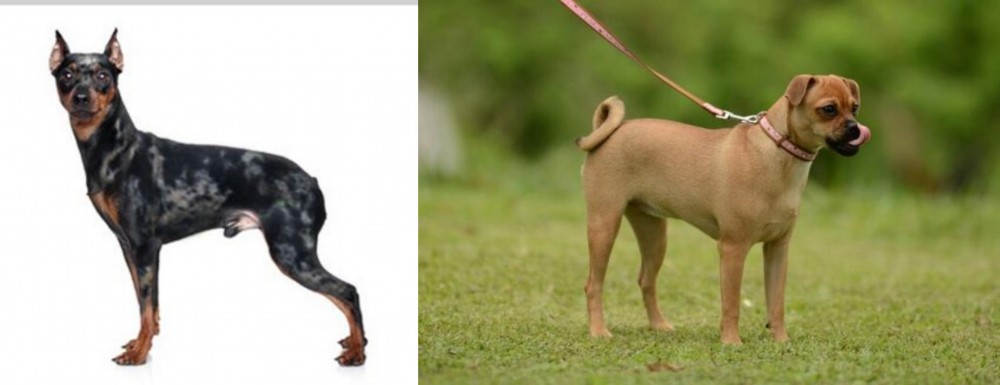 Harlequin Pinscher is originated from Germany but Muggin is originated from United States. Harlequin Pinscher may grow 19 cm / 8 inches higher than Muggin. Harlequin Pinscher may weigh 17 kg / 37 pounds lesser than Muggin. Both Harlequin Pinscher and Muggin has same life span. Both Harlequin Pinscher and Muggin has almost same litter size. Harlequin Pinscher requires Low Maintenance. But Muggin requires High Maintenance
Harlequin Pinscher is originated from Germany but Muggin is originated from United States. Harlequin Pinscher may grow 19 cm / 8 inches higher than Muggin. Harlequin Pinscher may weigh 17 kg / 37 pounds lesser than Muggin. Both Harlequin Pinscher and Muggin has same life span. Both Harlequin Pinscher and Muggin has almost same litter size. Harlequin Pinscher requires Low Maintenance. But Muggin requires High Maintenance
 This toy-sized dog is a type of Miniature Pinscher originating in Germany. The dog was developed by crossing traditional Miniature Pinschers with other toy-sized short-haired terriers. He falls into the Terrier category.
This toy-sized dog is a type of Miniature Pinscher originating in Germany. The dog was developed by crossing traditional Miniature Pinschers with other toy-sized short-haired terriers. He falls into the Terrier category.
The dog was used to kill rats, but has always been a devoted pet at the same time. They nearly became extinct after World War II, but the breed was once again restored. Today it is an established breed, but it isn’t recognized by any of the major kennel clubs.
In fact, The Harlequin Pinscher Association is the only breed club that recognizes the Harlequin Pinscher. It can be registered with the Harlequins Pinschers Association or with the American Canine Association.
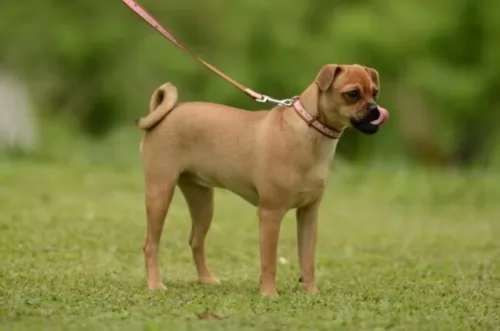 The Muggin is not a purebred dog but rather a cross breed. The hybrid dog population has exploding in the United States in the past ten to fifteen years. A lot of the success of crossbreeding can be attributed to the marketing of these dogs as “Designer Breeds”.
The Muggin is not a purebred dog but rather a cross breed. The hybrid dog population has exploding in the United States in the past ten to fifteen years. A lot of the success of crossbreeding can be attributed to the marketing of these dogs as “Designer Breeds”.
Designer breeds are developed because someone wants some of the characteristics of Breed X and some of the characteristics of Breed Y. Therefore, Designer breed XY is developed. In order to understand this hybrid dog, you need to understand the two purebred breeds they come from. The Muggin is the result of crossing the purebred Pug and the purebred Miniature Pinscher or Min Pin. So, we need to look at the origins of these two purebred breeds.
They are also referred to as Pin Pugs, Min Pin Pug, Pug Pin, Pugscher and were originally the Carlin Pinscher. However, these days there are other breeds besides the Pug and Min Pin making up the gene pool for the Carlin Pinscher. Because of this the Muggin has been separated from the Carlin Pinscher. The American Canine Hybrid Club has accepted the Muggin name for the Pug Min Pin cross.
Pugs are originally a Chinese breed and they were companions rather than working dogs of any kind. During the Han Dynasty they were the dogs of royalty. At the same time there were dogs very much like the pug in Japan and Tibet. The Pugs came to Europe by way of trades with the Dutch who then brought them to Europe. They were named the Mopshond and they caught the eye of the royalty in Europe as well.
Pugs were imported to the United States after the U.S. Civil War and in 1885 they were recognized by the American Kennel Club and called Pugs.
The Min Pin traces its origins to Germany a few hundred years ago. They were “ratters”, guarding the house and stables from all types of vermin. Most dog people believe that the Min Pin is much older than this, perhaps by thousands of years. Yet there is no detailed history to support that. Most believe the breed comes from the German Pinscher line. There might also be some Daschund and Greyhound in that line.
They were once called the Reh Pinscher. This was their name when they came to North America in 1919 and then the breed was renamed in 1972. The Miniature Pinscher Club of America was started in the early 1900’s while the AKC recognized the Min Pin in 1929. Today the Miniature Pinscher is a family dog, a companion.
The Muggin is a loving and loyal dog. All they want is for you to be happy and to share that happiness with them. They can also easily become a one person dog and bond intensely with that one person. They are not a hybrid that you can leave home alone while you go to work for 8 to 10 hours a day. No, the Muggin needs attention and lots of it. Despite this they are great with both kids and other dogs.
Because they are a cross breed, they are not recognized by the American Kennel Club. However, some hybrid registries do recognize the Muggin. These include the Designer Breed Registry, the International Designer Canine Registry, The Designer Dogs Kennel Club, the American Canine Hybrid Club, and the Dog Registry of America.
 This is a small compact dog standing at 25 – 33cm in height and weighing about 3kg to 4 or 5kg. He has dark eyes and ears which are set high and which are erect with just the top of them folding forwards.
This is a small compact dog standing at 25 – 33cm in height and weighing about 3kg to 4 or 5kg. He has dark eyes and ears which are set high and which are erect with just the top of them folding forwards.
The legs are straight and thin with small cat-like shaped paws. The tail is traditionally cropped, but these days the tail is left longer. He has a short coat which is available in a range of colors – black, brown, red, fawn patterns of merle, brindle or piebald. The Harlequin Pinscher is like a Bambi or a small deer, especially when they're a bit long in the leg.
Alert and inquisitive, the Harlequin Pinscher is a feisty, devoted little dog, brave and loyal and he has a lot of energy. He is intelligent too and with training and socialization, he becomes such a pleasure to have around, obedient and responding well to instructions.
He is known to be good with other pets as well as with children, so long as the children have been taught to respect animals. As always, a dog pretty much turns out the way the owners are, and with training and firmness while being patient and fair, you don’t have to worry about your Harlequin turning into a ‘small dog syndrome’ animal – whining, snappy and disagreeable. He is actually described as a big dog in a tiny dog's body.
The Harlequin Pinscher is a social dog and wants to be with you wherever you go.
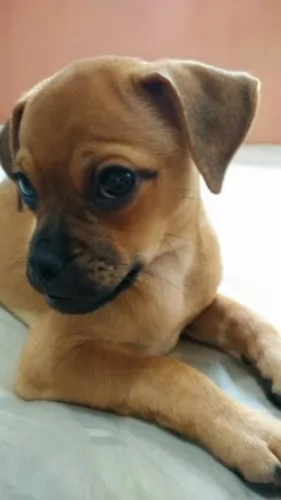 As previously mentioned, the Muggin is a cross between the Pug and the Miniature Pinscher. They are small, shave sturdy legs, floppy ears, and a wrinkled forehead for the most part. Like all hybrids however, all first generation dogs do not look the same. Some might resemble the Min Pin more and others the Pug. Some might have the stockier body of the Pug and the short tail of the Min Pin. Or one could have the Pug’s curly tail and the athletic body of the Min Pin. The snout can be short or long, the ears heavy and floppy or small and thin.
As previously mentioned, the Muggin is a cross between the Pug and the Miniature Pinscher. They are small, shave sturdy legs, floppy ears, and a wrinkled forehead for the most part. Like all hybrids however, all first generation dogs do not look the same. Some might resemble the Min Pin more and others the Pug. Some might have the stockier body of the Pug and the short tail of the Min Pin. Or one could have the Pug’s curly tail and the athletic body of the Min Pin. The snout can be short or long, the ears heavy and floppy or small and thin.
Their coats will usually be fine and short, and colors can vary a lot. They might be black and tan like a Min Pin, or more like a Pug with a solid color of cream, brown, black, white or golden. They also tend to shed quite a bit no matter which parent they take after the most. They will either have brown noses and black eyes or brown eyes and black noses or any combination of black and brown.
If Muggins are only bred to Muggins the second and third generations will resemble each other more than the first generations will. However, at this point many breeders will try to strengthen the breed by occasionally adding in to the gene pool other dog breeds.
 The Harlequin Pinscher may have once been good at catching rats but these days they are much more sought after for their ability to be a splendid companion and pet.
The Harlequin Pinscher may have once been good at catching rats but these days they are much more sought after for their ability to be a splendid companion and pet.
He is such an entertaining, social little dog, wanting to spend as much time with you as possible. He is fearless, energetic, playful, confident, loving and intelligent and those who have owned them say they are courageous way beyond their size.
He is strong willed, stubborn and confident and this larger-than-life dog is just waiting to show you what a wonderful friend he can be to you too.
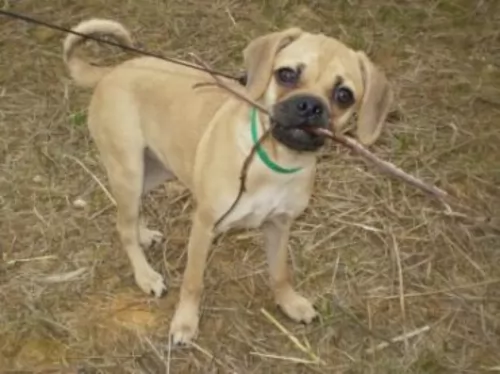 They are good with children but should be supervised.
They are good with children but should be supervised.
Energetic and loving little dogs.
Very adaptable if taken for walks or has space in a yard. Can live anywhere under those circumstances.
Very intelligent but strong willed dog. Needs strong leadership from their person.
 Harlequin Pinschers, just like other dog breeds, have health issues that they are prone to such as epilepsy, dental issues, obesity and Patellar Luxation.
Harlequin Pinschers, just like other dog breeds, have health issues that they are prone to such as epilepsy, dental issues, obesity and Patellar Luxation.
Some seizures in dogs are genetic or related to illness. A dog could have ingested something poisonous while a head injury can also cause seizures in dogs. If your pet has a seizure you may notice foaming at the mouth, drooling or twitching of the legs.
After a seizure you could see your dog walking in circles and bumping into things. It is important to get your pet to the vet as soon as possible.
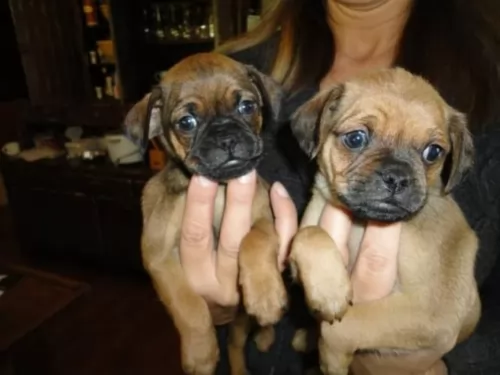 The first generation of Muggins may face all the health issues of either or both their parents, while second and third generations tend to have less health issues, They types of issues the first generation of Muggins might face include:
The first generation of Muggins may face all the health issues of either or both their parents, while second and third generations tend to have less health issues, They types of issues the first generation of Muggins might face include:
Nerve Degeneration – Degenerative Myelopathy or Dm – causes paralysis and eventually fatal.
 The short, smooth coat of the Harlequin Pinscher is easy to maintain, shedding little. With such a small, nimble dog, you can even take a damp cloth and wipe him down. You can brush him down once or twice a week to keep his coat healthy and shiny.
The short, smooth coat of the Harlequin Pinscher is easy to maintain, shedding little. With such a small, nimble dog, you can even take a damp cloth and wipe him down. You can brush him down once or twice a week to keep his coat healthy and shiny.
Dogs can develop dental problems such as tartar and plaque build-up. and this can lead to canine dental problems which can turn life-threatening as bad teeth affect the heart, kidneys and the liver.
You need to brush your pet's teeth 2 or 3 times a week making use of canine toothbrush and toothpaste. Never use regular human toothpaste for your dog as it can be poison to him. It is why dry kibble is better than soft food as the soft food sticks to the dogs teeth.
Your Harlequin Pinscher is also a member of the toy breed group and he has high energy levels. Always choose a high quality kibble for a small dog breed and also which is in keeping with his age and activity levels. He will do well on a high quality dry commercial food, some raw meat or home-cooked food such as chicken, brown rice, pasta and vegetables. If your dog is an energetic dog, he will benefit from a diet rich in protein.
It will be tempting to feed your little pet tasty treats such as chocolate, nuts, coffee and milk but be careful as these can cause severe digestive problems with your dog.
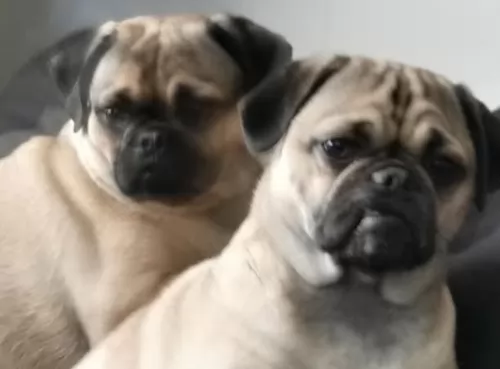 This crossbreed has a definite propensity to overeat and become obese from puppyhood. Feed the puppy a small dog dry food 3-4 times a day a total of ¾ of a cup to 1 cup.
This crossbreed has a definite propensity to overeat and become obese from puppyhood. Feed the puppy a small dog dry food 3-4 times a day a total of ¾ of a cup to 1 cup.
Again don’t over feed the adult Muggin or he will become obese easily. Feed at least twice a day one to one and half cups total.
High Energy
With the athleticism of the Min Pin taking precedence over the less active Pug, the Muggin is a fairly active dog. The Muggin is also not effective by the Pug’s difficulty with heat and cold. They love to go on long walks and need exercise to keep from being bored and destructive. However, remember there is a Pug in your Muggin and if she is not into exercise don’t try to get her to do more than she can.
You do want your Muggin to get enough exercise to fend off any tendency to be overweight. They are good at agility, jogging, obedience and watchdog activities.